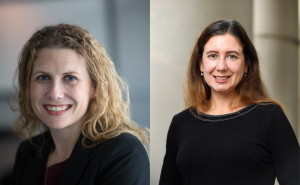The Science of Well-Being

Luke Kalb has spent over a decade focusing on the measurement, treatment, and epidemiology of mental health crises. It was only after earning his PhD and joining the faculty in Mental Health and at Kennedy Krieger Institute that he began exploring positive mental health and well-being—an experience that, he says, “stopped me in my tracks cold.”
“I was shocked to find a robust body of scientific research on well-being,” says Kalb, PhD ’17, MHS ’08, especially since he didn’t encounter the topic in any of his training. He became convinced by the evidence that there is a dimension of mental life beyond the absence of disease—and a role for public health beyond the mitigation of mental illness and crises. With funding from the Herbert Bearman Foundation, he designed the first course at the School that was solely focused on well-being: Public Health and the Good Life.
The course was launched last year, in the heart of the pandemic. As Kalb met with students virtually and heard about their challenges in everyday life, it became clear there is a wide need for practices we can all use to protect our mental health during stressful, uncertain times.
Here, Kalb shares some important ideas that students take from the course, along with some evidence-based strategies and tools to try.
- Take advantage of the well-being toolkit. There are many evidence-based practices—including mindfulness and meditation—that can improve well-being and prevent the onset of psychological distress. The Calm app (which Johns Hopkins offers for free to all faculty and staff) is a great place to start.
- Cultivate relationships. One of the most important influences on our well-being is our relationships with others. However, we are living in a world of deep isolation and discord. Staying in close contact with loved ones is critical, whether for a walk in the neighborhood or a phone or video call. Finding new social outlets, like joining clubs or attending socials (even if they’re virtual), can be especially helpful for students or others who are transitioning to a new location.
- Avoid the comparison trap. A number of biases are often baked into our thinking, and we need to be aware of them. For instance, we are prone to social comparisons. Historically, due to limited transportation, we could compare ourselves only to our neighbors. Now, social media allows us to compare ourselves to the most rich and famous people in the world. Those unrealistic comparisons and self-judgments can be distressing.
- Don’t overlook the basics. Many techniques to improve our well-being are readily available to us but not often discussed, such as protecting your sleep and leveraging gratitude. These simple practices can have profound downstream effects.
Public Health and the Good Life will be offered again starting in January 2022. New for this year: a focus on mHealth technologies. Kalb will bring in mHealth expert Johannes Thrul, PhD, MS, an assistant professor in Mental Health; and Omar Jalazada, co-founder CEO of Kin, to talk about how we can leverage digital peer supports to promote lasting behavior change.
Melissa Hartman is the managing editor of Hopkins Bloomberg Public Health magazine and associate director of editorial at the Johns Hopkins Bloomberg School of Public Health.



